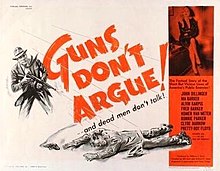Guns Don't Argue
| Guns Don't Argue | |
|---|---|

Film poster
|
|
| Directed by | Bill Karn & Richard Kahn |
| Produced by | William Faris |
| Screenplay by | William Faris; Phillips Lord |
| Starring |
Myron Healey Jean Harvey Paul Dubov Sam Edwards Richard Crane Lash LaRue |
| Music by | Paul Dunlap |
| Cinematography | Clark Ramsey |
| Edited by | Robert T. Spar |
|
Production
company |
Visual Drama Inc.
|
|
Release date
|
|
|
Running time
|
92 minutes |
| Country | United States |
| Language | English |
Guns Don't Argue is a 1957 low-budget feature film about the early achievements of the FBI in defeating the most notorious criminals of the 1930s. The film involves dramatizations of the crimes and eventual demise of various gangsters, along with a moralistic narrative. It was edited together from a composite of three episodes from the 1952 TV series Gangbusters.
The film was released to theatres in 1957 as a feature produced by William Faris, directed by Bill Karn & Richard Kahn.
A similar film, Gang Busters (1954), was also originally based on the dramatic radio program first titled G-Men, which premiered on July 20, 1935. The title was changed to Gang Busters on January 15, 1936.
The film takes the form of a docudrama in which actors who are cast as FBI Special Agents speak to camera about the war on gangsters in the mid-1920s through the late-1930s. Using contacts with gun molls, agents track down criminals. The film dramatizes the crime careers, and final capture or deaths of John Dillinger, the Barker Gang (Ma Barker, Fred Barker, Arthur Barker, Alvin Karpis), Bonnie and Clyde, Homer Van Meter, Doc Barker and Pretty-Boy Floyd. The "docudrama" does not portray events, many situations, or the FBI Special Agents accurately. For instants, the name of the FBI Special Agent who was killed in the Kansas City Massacre on June 17, 1933 is Raymond J. Caffrey & it was not his 1st day at the FBI. Names of all FBI Special Agents who have been killed in the line of duty may be found on the FBI Hall of Honor.
The film is considered by some to be a revisionist style of docudrama (it has serious difficulties with facts), which portrays the war on gangsters in the mid-1920s through the late-1930s, notably in favor of the FBI Special Agents involved, in some people's opinion. A very pro-Hoover style film, though J. Edgar Hoover's name is never mentioned, with narration of the criminal element in an over emphasized way. Though the film does show a counterpoint to the often romanticized lives of outlaws and criminals, it does so too far in the extreme. Where the real history gets muddled in the 1950s 'value' system.
...
Wikipedia
